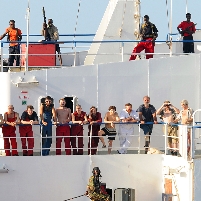Pirates Currently Hold 260 Hostages
Tuesday, April 14, 2009
 Pirates and Captives (photo:Jason R. Zalasky, U.S. Navy)
Pirates and Captives (photo:Jason R. Zalasky, U.S. Navy)
Lost in all the celebratory coverage of an American merchant captain’s rescue by Navy SEALS is the fact that 17 ships and approximately 260 hostages are still being held by pirates from Somalia. While the United States took umbrage over the capture of a single American citizen, the ordeal pales in comparison to the Philippines, which has nearly 100 sailors still in captivity. The ship that’s been held the longest is the chemical tanker Stolt Strength, seized on November 10, 2008 with a Filipino crew of 23.
Prior to the pirate attack last week on the Maersk Alabama, the most attention-grabbing assaults were on a Saudi supertanker, Sirius Star, carrying $100 million in oil, and a Ukrainian ship, MV Faina, transporting tanks and other military cargo. Pirates reportedly made more than $6 million in ransoms for these two vessels alone.
In 2008 there were 293 acts of piracy against ships worldwide, representing an 11% increase over the previous year. However, attacks off Somalia and in the Gulf of Aden increased nearly 200%.
Surprisingly, Somali piracy has a comparatively respectable origin. Somalia lost any semblance of a centralized government in the early 1990s. Sailors from other counties, including South Korea, Italy, Spain and Thailand, took advantage of the lack of effective policing to fish illegally in Somali waters. Even worse, ships from Europe and Asia began dumping toxic waste into the water. With no government forces to protect them, local fishermen formed militia to drive away the foreign vessels. Sometimes they apprehended and detained the crews. It wasn’t long before this led to pirate gangs seizing ships for ransom. Although there have been numerous notable exceptions, Somali pirates actually have a reputation for treating their hostages well, considering them common people who have done nothing wrong.
-Noel Brinkerhoff, David Wallechinsky
Ships Held by Somali Pirates (Reuters)
Q+A - Who are the Somali Pirates? (by Andrew Cawthorne, Reuters)
International Maritime Bureau Priacy Reporting Centre (International Chamber of Commerce)
List of Ships Attacked by Somali Pirates (Wikipedia)
- Top Stories
- Unusual News
- Where is the Money Going?
- Controversies
- U.S. and the World
- Appointments and Resignations
- Latest News
- Musk and Trump Fire Members of Congress
- Trump Calls for Violent Street Demonstrations Against Himself
- Trump Changes Name of Republican Party
- The 2024 Election By the Numbers
- Bashar al-Assad—The Fall of a Rabid AntiSemite






Comments